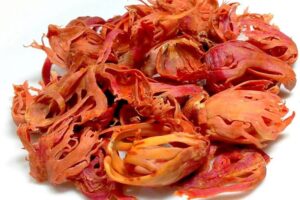Nutmeg Trade: Kerala's Aromatic Gem
Kerala, renowned for its spice bounty, is a major producer and exporter of nutmeg, the aromatic seed of the Myristica fragrans tree. Cherished for its warm, sweet flavor and medicinal properties, nutmeg plays a vital role in Kerala’s spice trade, contributing significantly to the state’s agricultural economy and international reputation.
The Kerala Advantage
Kerala’s tropical climate and fertile soils, especially in the Western Ghats, create ideal conditions for nutmeg cultivation. Kerala’s nutmeg is celebrated for its high oil content, intense fragrance, and superior quality, making it a prized ingredient in culinary, pharmaceutical, and cosmetic industries worldwide.
Farmers in Kerala adhere to sustainable, organic farming methods, ensuring that nutmeg production meets global standards while preserving the environment and enhancing soil fertility.
The Historical Significance of Nutmeg
Nutmeg has been an essential component of Kerala’s spice trade for centuries. Historical records show that nutmeg was highly valued in ancient trade routes, with demand from European, Middle Eastern, and Asian markets. Its culinary, medicinal, and preservative properties solidified its status as one of the world’s most sought-after spices.
Global Demand and Export
Nutmeg is widely used in flavoring savory and sweet dishes, beverages, and baked goods. It also plays a critical role in pharmaceutical formulations, aromatherapy, and personal care products.
Kerala’s nutmeg is exported to regions such as Europe, North America, the Middle East, and Southeast Asia. The increasing demand for natural and organic spices has further boosted Kerala’s standing as a premium supplier of nutmeg, creating new trade opportunities for exporters.
Health and Economic Benefits
Nutmeg is renowned for its health benefits, including anti-inflammatory, antimicrobial, and digestive properties. It is used to alleviate pain, improve digestion, and enhance sleep quality. Nutmeg oil is also valued in traditional medicine for treating respiratory issues and boosting immunity.
Economically, nutmeg cultivation supports numerous smallholder farmers in Kerala, providing them with reliable income and contributing to the prosperity of rural communities. The high market value of nutmeg ensures profitable returns for both farmers and exporters.
Sustainable and Ethical Practices
Kerala’s nutmeg farmers are increasingly adopting eco-friendly and organic farming techniques. These practices, which include natural pest control, organic fertilizers, and intercropping, promote long-term agricultural sustainability and reduce environmental impact.
Fair trade initiatives are gaining traction, ensuring fair wages and ethical labor practices. These initiatives bolster Kerala’s reputation as a source of ethically produced, high-quality nutmeg.
Trade Opportunities
Nutmeg offers significant opportunities for importers and exporters seeking to diversify their spice portfolios. Kerala’s extensive spice trade infrastructure, along with government initiatives to support farmers, makes sourcing high-quality nutmeg straightforward and profitable.
With the rising global demand for high-value spices, Kerala’s nutmeg trade holds great potential for growth and expansion.
Conclusion
Kerala’s nutmeg, prized for its aromatic flavor, medicinal properties, and cultural significance, continues to shine in the global spice market. By investing in this aromatic gem, traders can tap into new markets while supporting Kerala’s sustainable agricultural landscape. As the appetite for organic and ethically sourced spices grows, Kerala’s nutmeg trade is set to flourish, securing its place as a vital contributor to the international spice industry.




